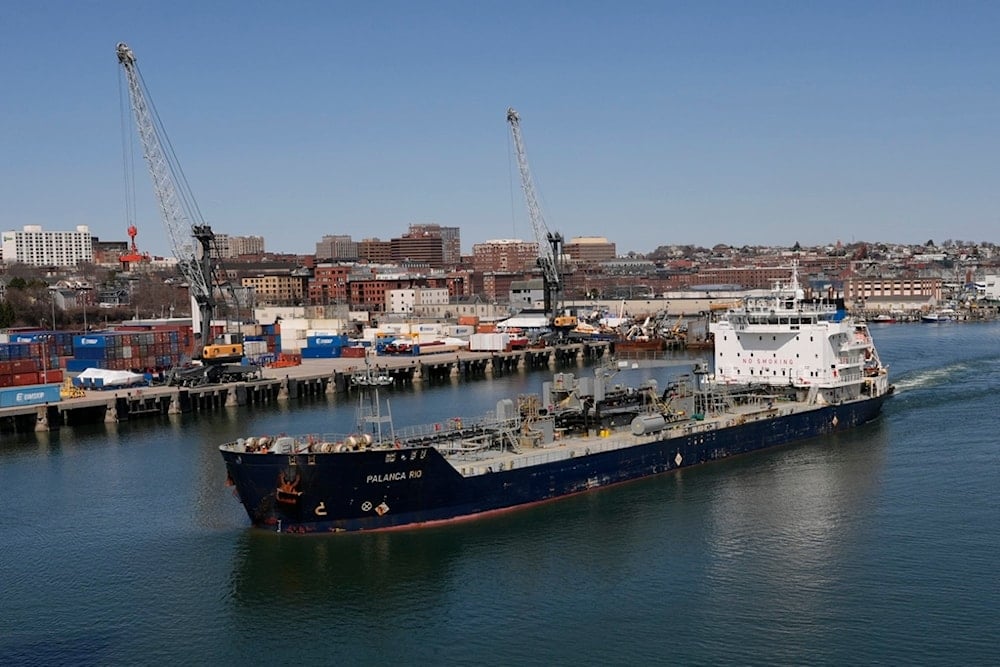Oil prices spike as US-Israeli aggression on Iran sparks concerns
Oil prices surge to five-month highs after US and Israeli strikes on Iran raise fears of supply cuts and disruptions in the Strait of Hormuz.
-

The oil tanker Palanca Rio arrives in Portland, Maine, the United States, on Wednesday, April 2, 2025. (AP)
Oil prices soared to their highest levels since January on Monday, following joint US-Israeli airstrikes on Iran’s nuclear facilities, deepening fears of a broader war in the Middle East, and disruption of global crude supply.
Brent crude futures rose by $1.52, or 1.97%, reaching $78.53 a barrel by 0503 GMT. US West Texas Intermediate (WTI) crude climbed $1.51, or 2.04%, to $75.35. Earlier in the session, both benchmarks spiked by more than 3%, touching five-month highs of $81.40 for Brent and $78.40 for WTI, before easing slightly.
The price rally came in response to President Donald Trump’s announcement that he had “obliterated” Iran’s key nuclear sites over the weekend, as Washington formally joined the Israeli regime in its ongoing aggression on Iran. Tehran vowed to retaliate, raising the stakes for oil markets already on edge.
Eyes turn to Strait of Hormuz
With Iran being the third-largest crude producer in OPEC, the strikes and the threat of regional escalation have stoked fears of a potential closure of the Strait of Hormuz, through which nearly 20% of the world’s crude oil is shipped. Analysts warn that any disruption in the waterway could lead to a dramatic rise in global oil prices.
“The current geopolitical escalation provides the fundamental catalyst for Brent prices to traverse higher and potentially spiral towards $100, with $120 per barrel appearing increasingly plausible,” said Sugandha Sachdeva, founder of research firm SS WealthStreet in New Delhi.
According to Iran’s state-run Press TV, lawmakers in Tehran have approved a bill to close the Strait, though past threats to do so have never been acted upon.
Rising risks to infrastructure
“The risks of damage to oil infrastructure... have multiplied,” said June Goh, a senior analyst at Sparta Commodities, noting that while alternative pipeline routes exist, they cannot fully compensate if the Strait becomes inaccessible. She added that shipping companies may begin avoiding the region altogether, reducing available global supply.
In a Sunday report, Goldman Sachs projected that Brent could briefly spike to $110 per barrel if oil flows through the Strait were halved for one month. Even with no major long-term disruption, the bank said, global markets would likely remain strained for nearly a year.
Despite this, the bank still assumes that no substantial disruption to oil and natural gas supply will take place, emphasizing that major global powers have strong incentives to avoid a prolonged energy crisis.
Since the beginning of the war on June 13, Brent crude has climbed 13%, while WTI has gained approximately 10% as concerns rise over the region's future.
Hormuz closure to trigger global oil shock
The CEO of the Russian Direct Investment Fund (RDIF) and Special Presidential Representative for Investment and Economic Cooperation, Kirill Dmitriev, warned that Iran's potential closure of the Strait of Hormuz would spark a global oil shock that would hit the United States as hard as the rest of the world.
In a statement posted on X, Dmitriev stressed that “oil is priced globally,” emphasizing that “if the Strait of Hormuz is shut, the U.S. won’t be spared. No one is immune from a global oil shock — prices at the pump will [skyrocket].”
Oil is priced globally. If the Strait of Hormuz is shut, the U.S. won’t be spared. No one is immune from a global oil shock - prices at the pump will 🚀. https://t.co/u4tsUQuDqC
— Kirill A. Dmitriev (@kadmitriev) June 22, 2025
Devastating economic fallout
Experts also warn that any closure of the Strait would not only impact global supply but also Iran’s own economy, as oil exports are a critical source of national revenue. “A sustained closure would inflict severe economic damage on Iran itself, making it a double-edged sword,” added Sachdeva.
The Strait of Hormuz, a narrow waterway between Iran and Oman that connects the Gulf to the Arabian Sea, handles about a fifth of global oil flows. Any disruptions to this corridor can have outsized effects on global trade and energy markets, according to The Financial Times.

 5 Min Read
5 Min Read









